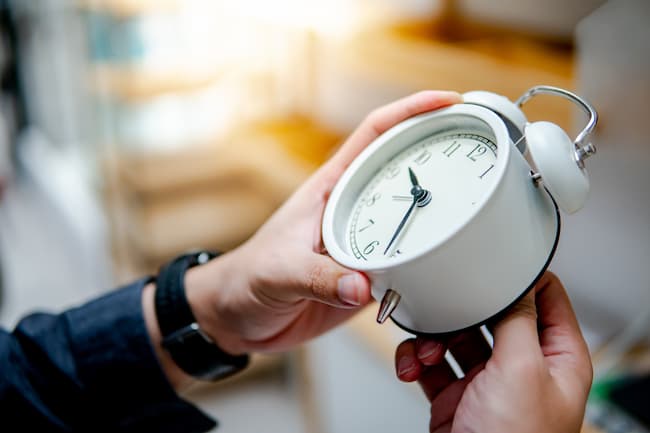Daylight saving time can wreak havoc on your sleep. Fortunately, there are ways you can ease the transition.
Daylight saving time officially begins at 2:00 AM local time on Sunday, March 13, 2022, meaning it’s time to set our clocks forward one hour. While it may seem easy enough to reset clocks and watches to a new time, it’s also important to reset your body’s clock.
Where did daylight saving time come from in the first place? It was first conceived by Benjamin Franklin way back in the 1700s, but was implemented in the United States in 1966 as a way to save energy by increasing the number of morning daylight hours.
When we “spring forward,” it can mess with our established sleep schedules and lead to daytime sleepiness. Plus, the change means that it’s light out later which can impact our body’s natural rhythms, a 24-hour cycle known as circadian rhythms.
Tackle this spring’s time change with these tips:
- Help your body adjust. No matter your usual sleep habits, it’s normal to have difficulty adjusting to the time change. In fact, the time change can seem like a milder version of the jet lag you experience when flying from one time zone to another. If your schedule allows, tweak your usual bedtime for a night or two in advance of the time change. On the first night, go to bed 15 minutes earlier than usual and wake up 15 minutes earlier the following morning. On the second night, make it 30 minutes earlier, waking up 30 minutes earlier the next morning. This will help your body begin to acclimate to the time change.
- Pay attention to light. In a world where clocks aren’t present, the body’s circadian rhythms wake you when it’s light and make you sleepy when it’s dark. They’re tied directly to light exposure. Once we spring forward, help your body settle into the natural rhythm of things by “seeking the light” first thing each morning. Open up the blinds and let the morning sun in early to help your body awaken. Head outdoors if you can for some additional sun exposure. In the evenings, dim the lights in your home and limit your media usage, which exposes your body to unnatural light. These habits will help your body ease into sleep.
- Stick to the rest of your routine. As much as possible, stick to the other elements of your routine as much as possible. Stay hydrated, exercise, take time to socialize, and eat consistently. These nourishing habits will help your body weather the time change with more ease.
- Avoid long naps, alcohol, and caffeine. Each of these things – as well as any other stimulants – could inhibit your ability to get to sleep or to get deep, restful sleep. The bottom line: do what it takes to get enough quality sleep each night – even if that means you’re a little sleepy during the afternoon for a few days.
Don’t think you’re getting your best sleep? We can help. The Erlanger Sleep Disorders Center offers diagnosis and treatment for a full range of sleep disorders.







